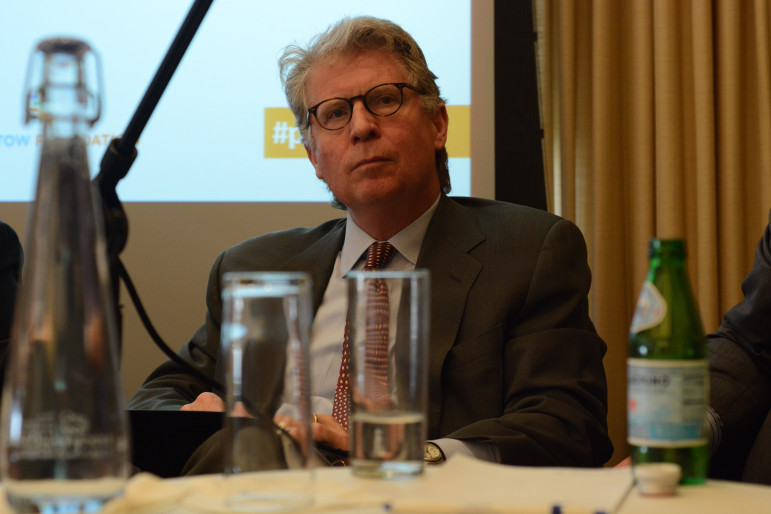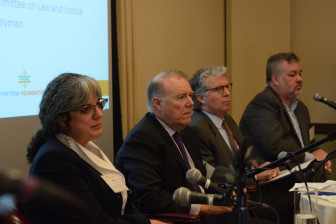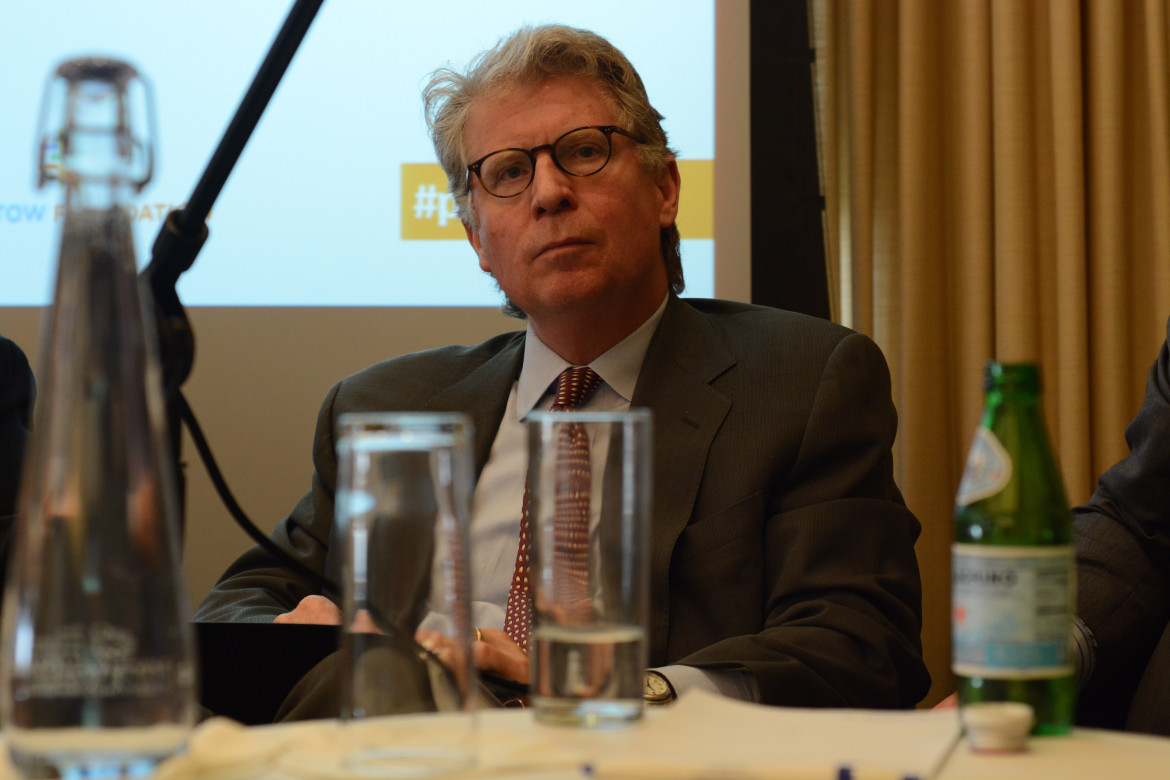
Gwen McClure
Cyrus Vance Jr., Manhattan district attorney, participates in a panel discussion on Tuesday at Columbia University’s Mailman School of Public Health.
NEW YORK — In a spirited and candid discussion Tuesday morning between elected officials and researchers at a conference on incarceration reform at Columbia University’s Mailman School of Public Health, Manhattan district attorney Cyrus Vance Jr. said that the business model of how his office operates “does not make sense” and that it fails young, minor offenders who pile up misdemeanors until they face serious consequences in the criminal justice system.
 “I think in almost in every prosecution office I know of, at least state prosecutors, as a business model we don’t make sense, because we put our youngest assistants, and not the most resources on the largest number of cases we deal with,” he said. “And ultimately I think we fail as a system because we have yet to figure out how to balance punishment with what amount of punishment, or what influence on someone who is charged with a crime will actually result in them becoming less likely to commit a crime going forward.”
“I think in almost in every prosecution office I know of, at least state prosecutors, as a business model we don’t make sense, because we put our youngest assistants, and not the most resources on the largest number of cases we deal with,” he said. “And ultimately I think we fail as a system because we have yet to figure out how to balance punishment with what amount of punishment, or what influence on someone who is charged with a crime will actually result in them becoming less likely to commit a crime going forward.”
Vance added that in a massive criminal justice system like in Manhattan, for which he has been the district attorney since 2010, it is difficult to track each case that comes through his office and tailor programs to steer offenders out of the system in the future.
“In a system as large as ours, 100,000 cases a year in our court alone,” Vance said, “there is a real likelihood that unless you are focused on identifying those individuals who have the most negative impact on the communities you’re going to miss them and not have the opportunity to deal with them.”

Gwen McClure
(Left to right) Arlene Lee, director of the Committee on Law and Justice; moderator John Feinblatt, Manhattan DA Cyrus Vance Jr., and New York State Assemblyman Daniel O' Donnell
Vance’s comments came as part of the first day of a two-day conference called “A Public Health Approach to Incarceration: Opportunities for Action” held at the Columbia University Faculty House He was part of a panel that organizers said was aimed at figuring out how researchers can deliver information to policy makers in a meaningful and useful way. Vance was joined by New York State Assemblyman Daniel O’Donnell, director of the Committee on Law and Justice Arlene Lee and moderator John Feinblatt, who was formerly the criminal justice coordinator under former mayor Michael Bloomberg and currently is president of Everytown for Gun Safety.
During the discussion Vance said his office handles cases ranging from rapes and murders and international money laundering to a host of minor offenses. He said of those cases, 90,000 are misdemeanors that are traditionally dealt with by 60 or so first- and second- year law graduates. The minority of serious cases are handled by 480 seasoned assistant district attorneys.
He said his office is not alone in this broken business model, and added that it often hurts younger defendants disproportionately.
“So let me give you an example in the misdemeanor world that is very frustrating,” he said. “An individual comes down, a young person, and gets arrested for petit larceny. He comes into the justice system, his or her case is charged and typically that individual walks out the door with what’s called an ACD — adjournment contemplation of dismissal — which is dismissed in six months.”
He said that in and of itself there’s nothing wrong with that process, except that his office and other prosecutors offices across the country don’t have the resources to track that same hypothetical defendant to make sure he or she does not reoffend.
“But if you’re a young person and you walk out of court with what is going to be a dismissal that’s not necessarily a good lesson for you to say, ‘There’s a risk here and I don't want to do it again.’ So you’ll get arrested again and the next time the disposition will be slightly more serious. By the time you pay attention to these kids they’ve had three or four or five arrests and convictions. And then we look at them and we now have a problem, and so they are treated more harshly.”
Vance said the traditional model practiced by his office does not do enough to help keep young people out of the system.
“We fail them by not investing our resources in the front end at the lower level cases where we have an opportunity to influence people who are first coming into the criminal justice system and refraining them from reoffending in minor crimes,” he said. “I think we fail.”
Feinblatt said he sympathized with Vance’s conundrum, remembering his own pangs of conscience when he was a public defender.
“The thing that always perplexed me was this thing that Cy is talking about right now,” he said, referring to Vance. “My job in some ways was to get the least dosage as humanly possible for my clients, particularly at the lower end. And yet in my heart of hearts, I often thought a higher dosage at that point might prevent me from ever seeing them again. And I could never reconcile that because it was sort of two value systems that collided.”
O’Donnell said he was a “chubby 24-year-old kid from Long Island” when he started as a public defender in Brooklyn, but that it shaped him as a legislator and informs the policies he pushes for in Albany today.
“What I learned was almost everyone I represented, on particularly the serious crimes, less so on the smaller ones, were there because all the other systems in our society had failed them,” he said. “The education system had failed them, the health care system had failed them, the mental health system had failed them, everything had failed them and now we were the system of last resort. And it bothered me.”
He agreed with the other panelists that preventing crime is not limited to his office and other law enforcement agencies.
“If you want to fight crime you need better education, you need better employment opportunities, you need a sensible drug policy. And I don’t think any person with common sense would debate from a public health, or any other standard, that if those issues were addressed effectively by the president, the governors, the city elected officials around the country, that would have an impact.”
Vance said his office and the NYPD are part of a “philosophical shift” taking place in law enforcement across the country that recognizes crime prevention programs as an essential policy tool available to them. He talked about programs he has developed, like hosting sports for teenagers on weekend nights when they are most at risk.
“If we want to keep people out of prison and out of jail we have to engage them more effectively when they’re young and to do that you need to put resources in,” he said. “You need to have police officers and prosecutors understand that its okay for that to be part of their job, and you need to measure success for those offices not just on number of convictions but on how they demonstrate that their work in total is effective in driving crime down.”
One of the frustrations he said he and his fellow district attorneys in New York City have is that they do not have a consensus on what alternatives to incarceration programs are effective, and which even qualify as such by the court.
“Maybe there’s a clear answer,” he said. “But I feel that there are all sorts of programs that are offered, but not a lot of understanding as to actually what they’re best at. And not a common understanding between defense lawyers, prosecutors and judges about what’s best for an individual person.”
Financial supporters of The JJIE may be quoted or mentioned in our stories. They may also be the subjects of our stories.

